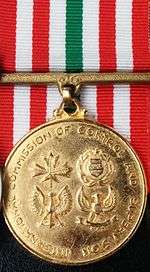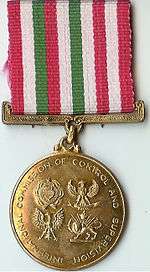International Commission of Control and Supervision Medal
| International Commission of Control and Supervision Service Medal | |
|---|---|
|
First version (left) and final version of the ICCS Medal. The change reflects Canadian participation in the beginning, being replaced by Iran in the end | |
| Awarded by International Commission of Control and Supervision (ICCS) | |
| Type | Service Award |
| Eligibility | Personnel who served with the ICCS |
| Awarded for | 90 days of service |
| Status | No longer awarded |
| Statistics | |
| Established | 1973 |
| Last awarded | 1975 |
| Order of Wear | |
| Next (higher) | Varies by country |
| Next (lower) | Varies by country |
| Related | International Commission for Supervision and Control Medal |
|
First ribbon during the service of Canada, Hungary, Poland and Indonesia Second ribbon during the service of Hungary, Indonesia, Poland, and Iran | |
The International Commission of Control and Supervision Medal is a service medal awarded to personnel from the four countries that made up the International Commission of Control and Supervision (ICCS). The ICCS was established by the Paris Peace Accords in 1973 to supervise the cease-fire, the withdrawal of troops, the dismantlement of military bases, the activity at ports of entry and the return of captured military personnel and foreign civilians. It was to report on the implementation, or violation, of the Peace Agreement and Protocols. Initially made up of personnel from Canada, Hungary, Indonesia, and Poland, the Canadians withdrew in July 1973 being replaced by personnel from Iran. The work of the ICCS continued until the 1975 Fall of Saigon.
Criteria
Personnel of ICCS member nations served in various locations throughout Vietnam investigating compliance and monitoring enforcement of the peace accords. The commission also oversaw the return of military prisoners of war and civilian political detainees.[1] The International Commission of Control and Supervision Medal was awarded for 90 days of cumulative service between 28 January 1973 to 30 April 1975.[2]
Appearance
The International Commission of Control and Supervision Medal is a circular medal made of gilt metal 36 mm (1.4 in)) in diameter. The obverse depicts symbols of four the contributing nations: a Canadian maple leaf, the Coat of arms of Hungary, the Polish Eagle, and the Coat of arms of Indonesia. Around the edge are the words: INTERNATIONAL COMMISSION OF CONTROL AND SUPERVISION. The reverse bears the inscription in three lines SERVICE VIETNAM 27-1-73 surrounded by a laurel wreath.[2]
The medal hangs from a ring suspension that is attached to a thin metal bar with a laurel pattern. The ribbon of the medal is nine equal stripes of red, white, red, white, green, white, red, white, and red.[2]
After Canada left the ICCS, it was replaced by Iran. The medal was modified replacing the maple leaf with the Lion and Sun Emblem of Iran. The ribbon was modified to be ten equal stripes of red, white, green, red, white, green, white, red, white, and red.
In the 1990's a version was made for Canadian civilians who did not receive the original 1973 medal. The civilian version was of a higher quality with a thicker planchet and a solid straight bar suspender with claw attachment.[3]
Order of wear
| Country | Preceding | Following |
| Order of precedence[4] | International Commission for Supervision and Control Medal | Multinational Force and Observers Medal |
See also
References
- ↑ "Details/Information for Canadian Forces (CF) Operation GALLANT". National Defence and Canadian Forces. Retrieved 17 November 2015.
- 1 2 3 "International Commission of Control and Supervision Vietnam (ICCS)". Canadian Honours Chart. National Defence and Canadian Forces. Retrieved 17 November 2015.
- ↑ McCreery, Christopher (2008). The Canadian Honours System. Toronto: Dundurn Press. p. 241. ISBN 9781554880171.
- ↑ "Canadian Honours Chart". National Defence and the Canadian Forces. Retrieved 18 November 2015.

